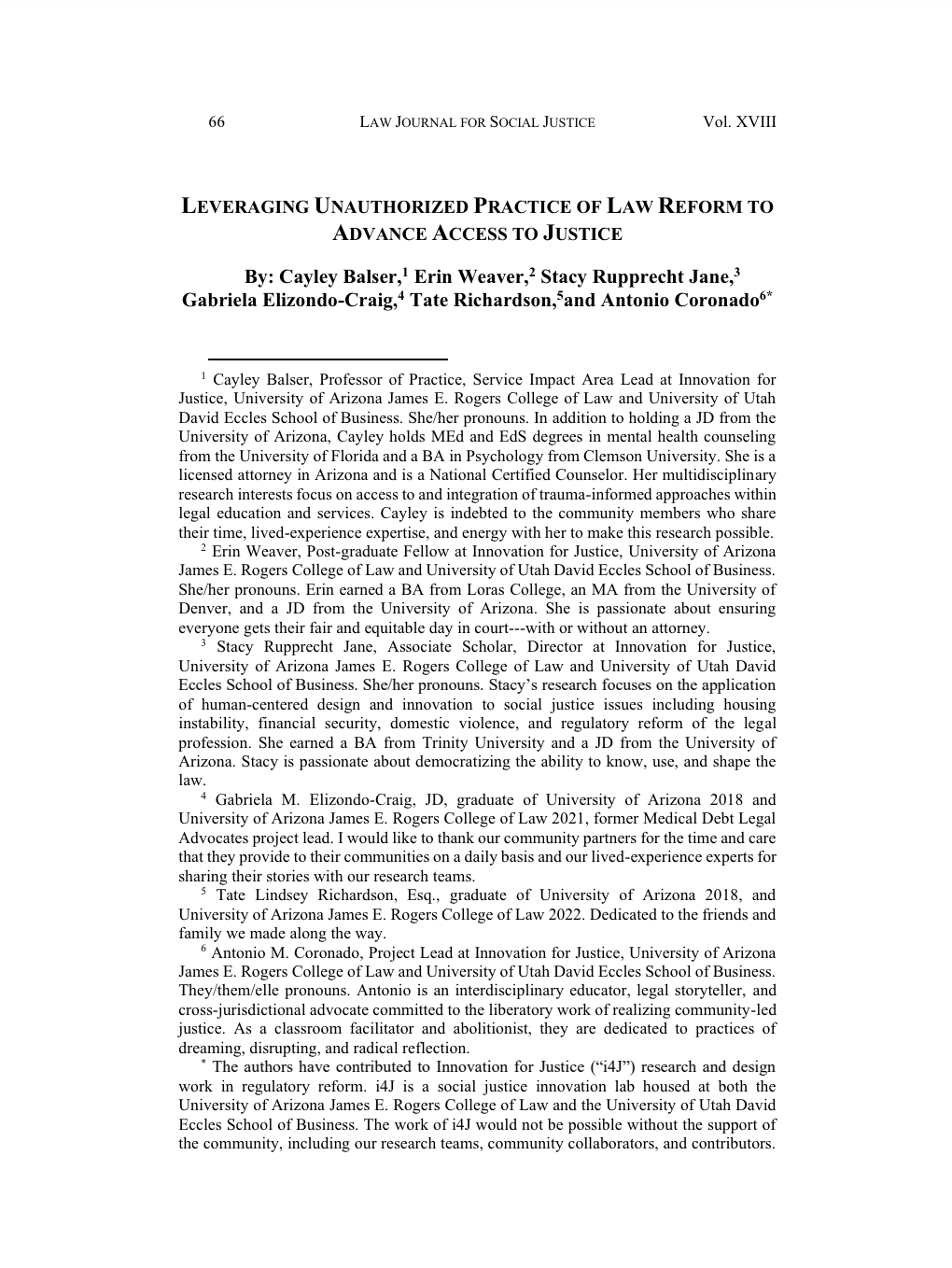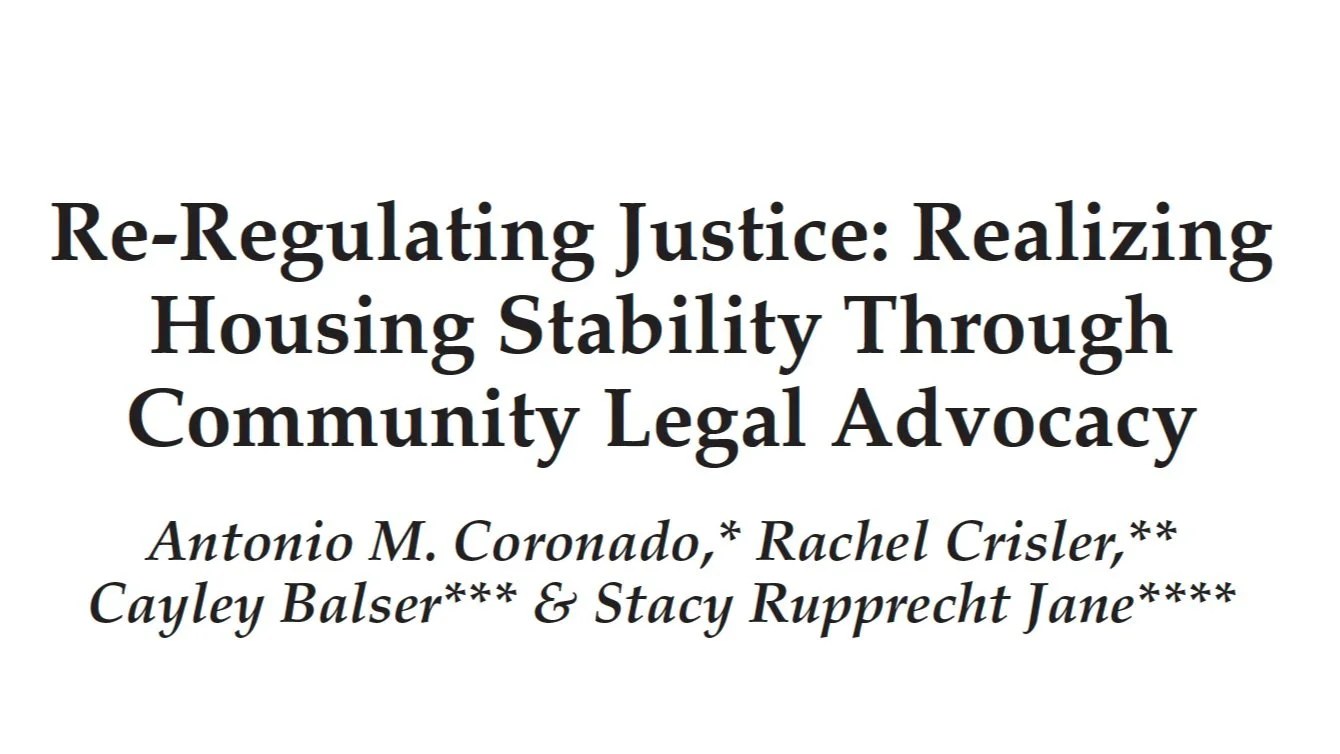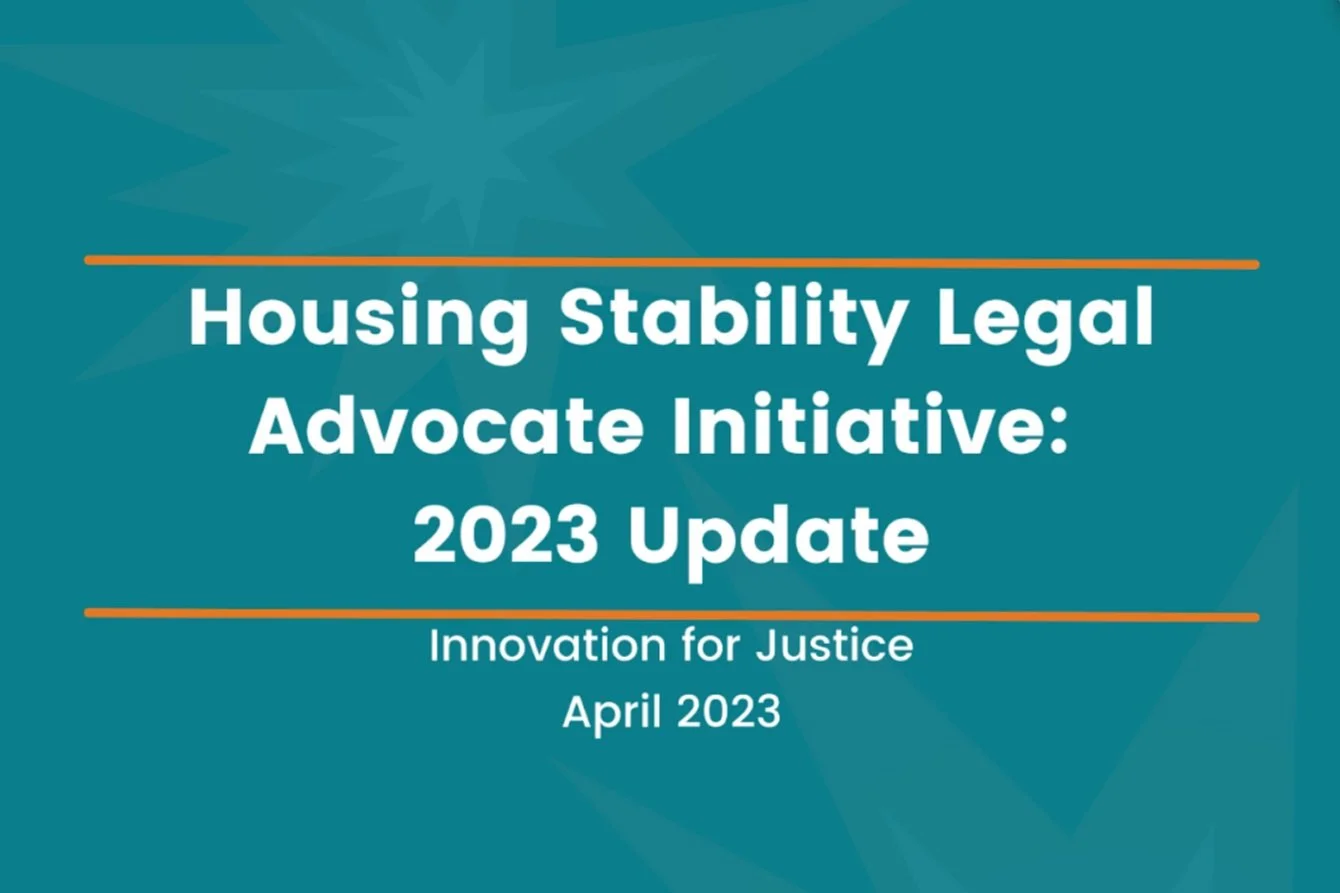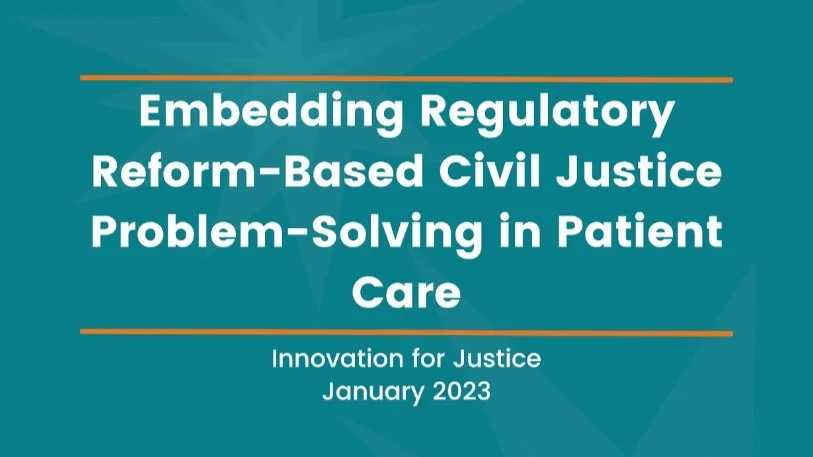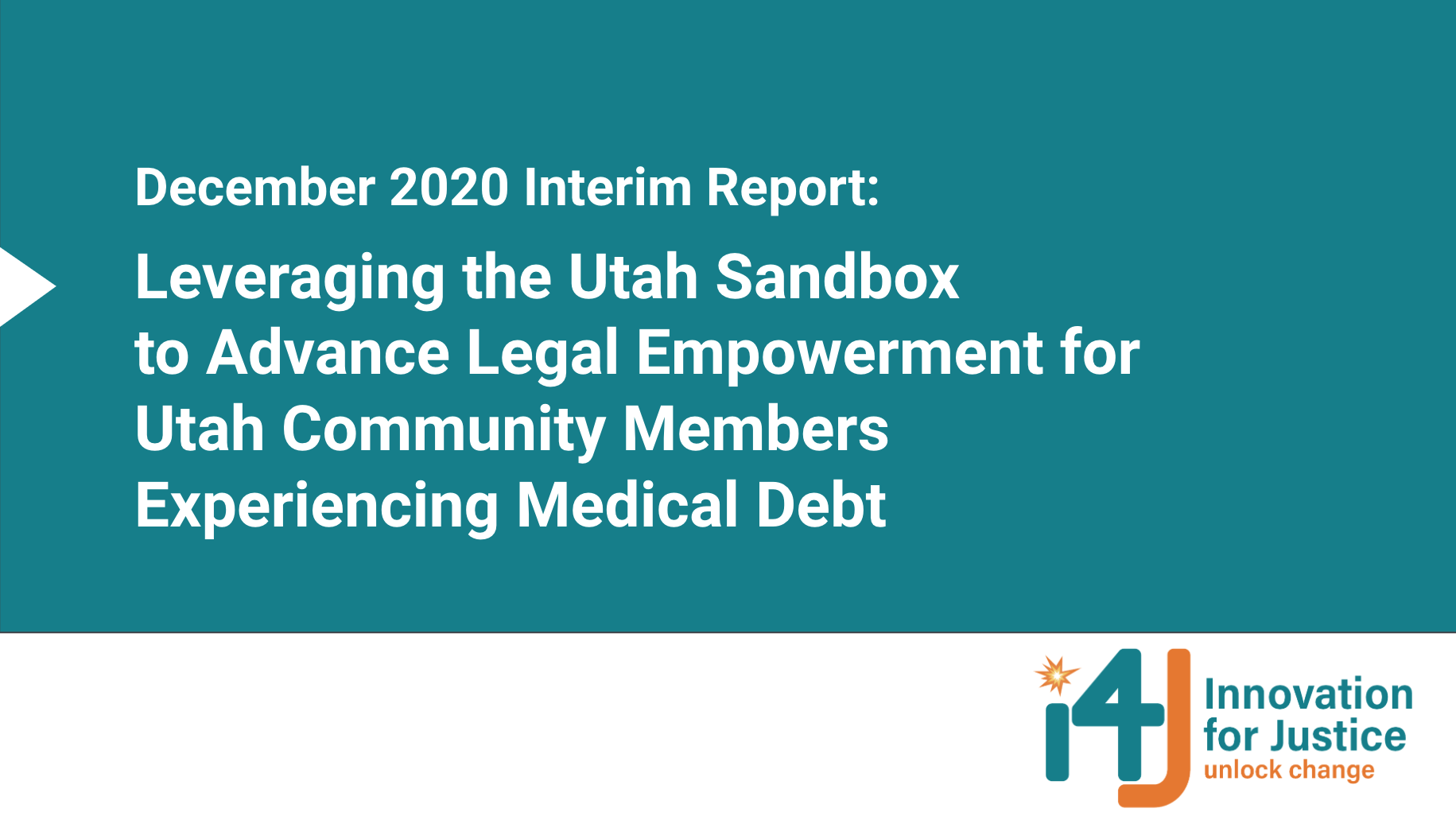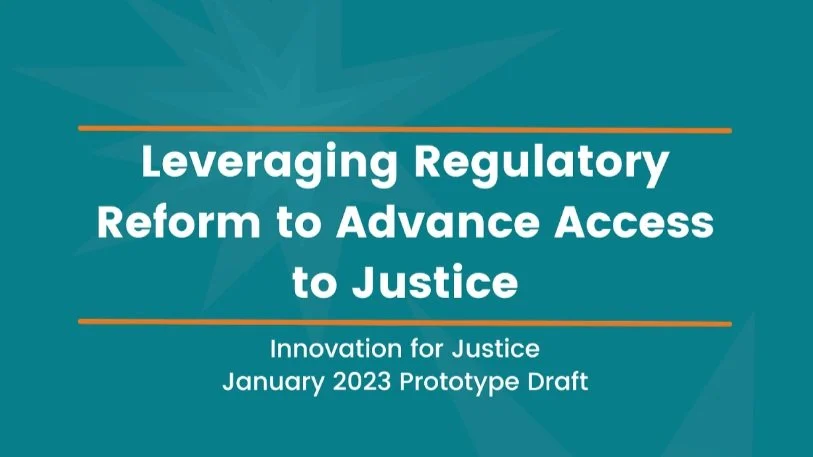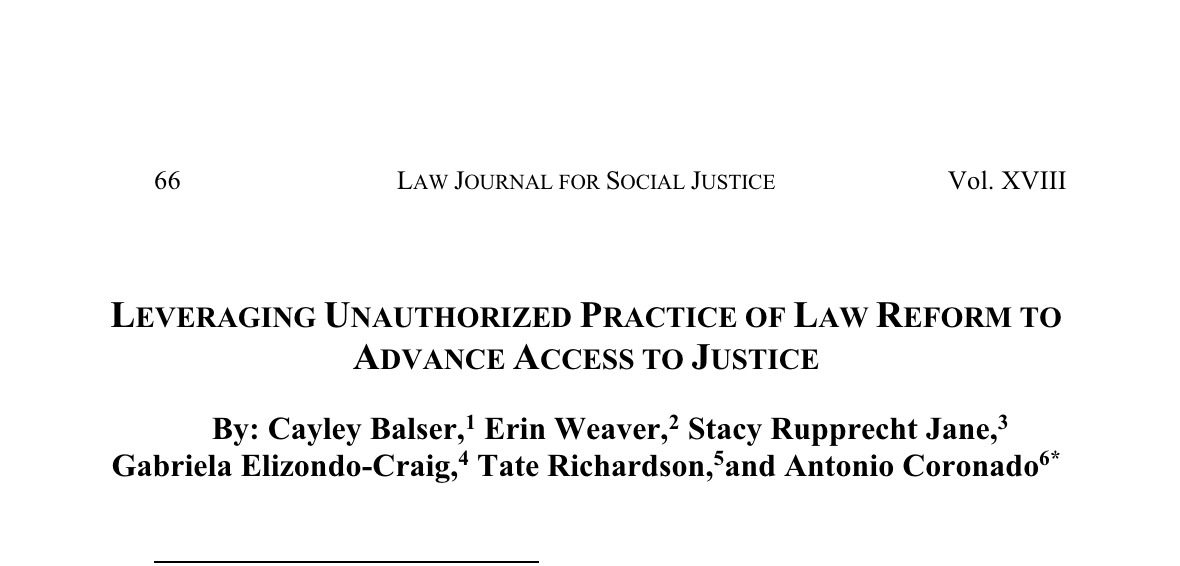Service Impact Area
Creating new legal service models.
Reform of civil legal service unauthorized practice of law (UPL) regulation presents a tipping point in the U.S. legal market, and there is limited opportunity to embed access-to-justice goals and models to ensure that underrepresented populations are served by these reforms. Innovation for Justice (i4J) is at the forefront of this work and is uniquely positioned as an inclusive design hub that brings the potentially divergent goals of UPL reform decision-makers, legal service providers, and systemically disinvested communities together in advancing access to justice.
In these early days of UPL reform, there is both risk and opportunity. The risk: UPL reform efforts may fall short of their potential, creating new service models that embed old legal service problems into new regulation. The opportunity: to view UPL reform from the outset as a chance to radically re-imagine the pathways for connecting people with civil justice needs — particularly those systemically disinvested and historically excluded from access to justice — to civil justice problem-solving.
What is legal empowerment?
Legal empowerment is a global, grassroots justice movement “that democratizes laws and centers people in their own fight for justice by creating opportunities for people to ‘know, use, and shape’ the laws that impact their lives.” A hallmark of legal empowerment is that it is driven by community members who are most affected by injustice, with lawyers and other professionals acting in supporting — rather than leading — roles.
In the Service Impact Area, i4J situates multiple and diverse system actors as co-researchers through implementation of participatory action research (PAR) methodology, emphasizing the learned and lived experience of those closest to the problem. In these projects, system actors contribute to the framing, scope, details, and analysis throughout projects. Implementing a trauma-informed approach to this research further creates an opportunity to develop legal service models and that embed trauma-informed practices from the outset. This prioritizes the dignity, value, and worth of individuals seeking services, regardless of their current circumstances, and mitigates the risk of replicating service models that retraumatize individuals as they seek justice.
What is unauthorized practice of law reform?
In nearly every state in the US, unauthorized practice of law restrictions prohibit anyone who is not a licensed attorney from providing legal services. UPL reform refers to the re-regulation of the practice of law, including providing legal advice, to allow people who aren’t attorneys but have specialized legal training to provide legal services, including legal advice, to community members.
“The opposite of poverty is justice.”
— Bryan Stevenson
Why does UPL reform matter?
In the United States, there is no right to counsel for civil cases. This means that if a person is experiencing debt collection, domestic violence, or eviction, they are not guaranteed a lawyer. The under-resourced nonprofit legal service sector lacks the capacity to serve many who seek their services: 93% of low-income Americans receive inadequate or no civil legal assistance. The historic exclusion of low-income and other systemically disinvested communities from access to justice perpetuates poverty cycles and system-level failures. Further, Legal Service Corporation-funded legal service providers are prohibited from using LSC funds to provide services to incarcerated and undocumented community members, which contributes to the access to justice crisis for these communities.
By authorizing new pathways for people other than lawyers to know and use the law, UPL reform presents an opportunity for community members who otherwise cannot access legal help or are excluded from utilizing existing resources to receive advice and problem-solving help from trusted members of their community. The ability to successfully know and use the law plays a critical role in legal empowerment, poverty reduction, and social change.
i4J and UPL reform
Since 2019, Innovation for Justice (i4J) has been at the forefront of designing service models that leverage UPL reform. These projects include:
-

Domestic Violence Legal Advocate Initiative in Arizona
-

Medical Debt Legal Advocate Initiative in Utah
-

Housing Stability Legal Advocate Initiative in Arizona and Utah
-

Community Justice Workers & Health in West Valley City, Utah
i4J’s work in the space is unique because it emphasizes the importance and inclusion of four diverse system actors in design work:
Community members who are in a position to leverage UPL reform opportunities;
Community-members who would benefit from services authorized through UPL reform mechanisms;
UPL reform decision-makers; and
The design hub: an inclusive research and design entity who can gather legal need information from the first three system actors and help synthesize the potentially divergent goals of these 3 system actors into effective new legal service models.
The first three system actors interface at various opportunity spaces in the system of civil justice problem-solving; the design hub brings these system actors to the table to work together to create systems and services that are more equitable and informed by multiple perspectives. This includes and emphasizes the perspectives, lived, and learned experience of community members historically and actively excluded from access to justice decision-making conversations.
While most of the projects in i4J’s Service Impact Area focus on UPL-reform-based interventions, there is also opportunity for legal service innovation within the existing regulatory structure. This includes projects that focus on engaging diverse system actors in new programs and designing service models that get closer to the existing regulatory line.
i4J Report: Service
To learn more about i4J’s years of design hub work in the Service Impact Area, read Leveraging Unauthorized Practice of Law Reform to Advance Access to Justice in the Law Journal for Social Justice.
Service Impact Area Publications and Reports
i4J's Service Impact Area engages in robust participatory action research in the design of new legal service models. Findings and recommendations from service model design are reported out to the community and in the access to justice research space through reports and publications for each project. To learn more, see our reports and publications below.


